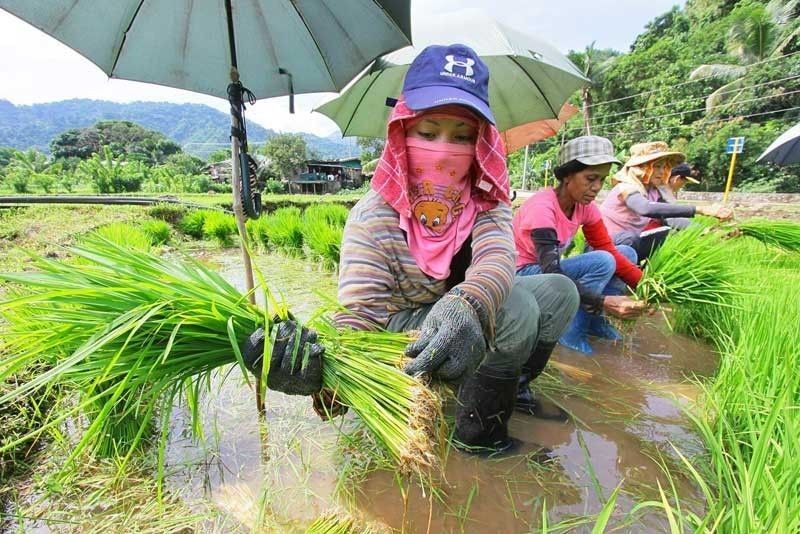Marcos Jr. admin bets on other sectors' rapid expansion to justify dismal agri growth target

MANILA, Philippines — The National Economic and Development Authority hedged its bets on the rapid expansion of the industry and services segment of the domestic economy to lift Filipinos in the agriculture sector and rural areas out of poverty, justifying the Marcos Jr. administration’s low growth targets on the sector.
Analysts however believe the national government can do more, considering the burden of inflation grows heavier by the day.
Pressed on the government's plans for the agriculture sector, NEDA chief Arsenio Balisacan told members of the private sector on Wednesday that the Marcos Jr. administration is aiming for the agriculture, forestry, and fisheries sector to grow at a pace of 1.8-3.3% annually within its term, as indicated in the Philippine Development Plan 2023-2028.
“It’s not uncommon for agriculture, especially in the middle stages of development, to grow slower than the rest of the economy,” Balisacan said in the Wallace Business Forum roundtable.
That said, the World Bank is expecting dismal growth figures in the sector. The international financial institution forecast in December showed that the country’s agriculture sector will expand at a sluggish pace of 0.1% annually until 2025.
“If you look at Indonesia, Thailand and Vietnam, as their industrialization proceeds their agriculture, household incomes increasingly come from non-agricultural sources, members of the family become employed,” he added.
To this end, the NEDA chief is eyeing growth from the industry and services sectors to lift from poverty agriculture-centred households, especially those residing in rural areas.
Agriculture historically accounts for 10% of the Philippines’ gross domestic product, but missteps in policy and reforms kept workers languishing in poverty.
'The miracle story of poverty reduction'
Balisacan highlighted that this trend of industrialization and economic development has been observed in Asia, but the Philippines’ agriculture sector has yet to see better days. In past months, shortages of foodstuff, whether artificial or not, fueled consumer price growth to a 14-year high.
The country’s inflationary woes came from supply problems, as disruptions and bottlenecks persisted since the pandemic. Inflation in February settled at 8.6%, but expectations now point to a downtrend in the coming months. To contain surging prices, the national government resorted to importing food and agricultural products.
Nicholas Antonio Mapa, senior economist at ING Bank in Manila, agreed with the assessment but offered caveats.
“Although we agree that the growth of particular sectors (in this case agriculture) are expected to moderate during stages of development, this usually proceeds periods of fast growth and substantial expansion,” he said in a Viber message.
Economic managers of the Marcos Jr. administration deemed it necessary to create a body to advise the executive branch on inflationary and economic woes alike.
“We believe there remains room for substantial improvement in agriculture to help safeguard food security as well as provide employment opportunities for the workforce,” Mapa added.
Leonardo Lanzona, an economist at Ateneo De Manila University, called out Balisacan’s pronouncements.
“The growth in non-agri sectors should be higher than agriculture. But development or the reductions in investment constraints should not impose limits on the growth of agriculture,” he said.
Lanzona explained that growth in other sectors could become unsustainable unless the agriculture sector continues to expand.
As it is, President Ferdinand Marcos Jr. currently leads the agriculture department as he has yet to name a replacement for the position.
Domini Velasquez, chief economist at China Banking Corp., spotlighted the sector’s sluggish growth. She explained that the agriculture sector’s problems are rooted in its low linkages with value chains and simply specializing in basic commodities such as rice and livestock.
“There needs to be more initiatives to move up these items to processed food or food manufactures ready for exports. This will ensure produce will last longer and provide more income for the Filipinos in the agriculture sector,” she said in a Viber message.
While these innovations will take time, these proposals have been floated in the past. Experts proposed that the national government direct investments in food security to mitigate its inflation problems, introduce reforms or even invest in tech innovations to spur the sector’s modernization.
“Renewed focus on the country's agriculture potential will lift more people out of poverty and will reduce uncertainty for those employed in the sector,” Velasquez added.
- Latest
- Trending
































